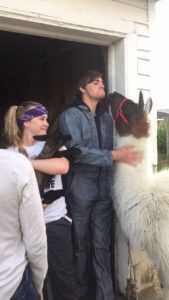On Memorial Day, we had the honor of meeting with renowned author and climate change expert, Connie Mutel. Not only is Dr. Mutel a well-known a science writer, but she is employed by the Iowa Institute for Hydroscience and Engineering. Because of her background, Dr. Mutel is very well versed in in her field, and has first-hand knowledge of how climate change has had a direct impacted on Iowa. When we first arrived at the Mutel house in Solon, I was instantly taken by the beauty of their landscape. It is only fitting that a climate change expert would take great care and show respect for her land. The acreage is all restored prairie land. The way their property looks today, is the way it would have looked in the late 19th century. Once we went inside, it was just as beautiful as the property. On a side note, her and her husband Bob built the house together in the 1970s. We set up shop in the living room and began our lecture on climate change.
My favorite thing about Dr. Mutel was how personal the lecture was. In her newest book, Sugar Creek Chronicle, she emphasized the personal message and narrative. According to her, readers don’t like being told what to do. They like hearing personal stories and options about what can be done. I agree with this idea. Sugar Creek Chronicle is dedicated to her first-born granddaughter. Mutel begins her work by explaining how the world she grew up in is vastly different than the one her granddaughter will experience. She even shared examples of how the personal message in the work touched her readers and inspired change.
At the heart of her lecture, Mutel talked about land transformation from the founding of Iowa in the 1800s to present day. When the first European settlers arrived on the western bank of the Mississippi River in the mid-nineteenth century, they began making the land farmable. They tilled the dense prairie landscape with powerful horses, uprooting thousands of trees and plants, all in hopes of making the land profitable. This proved successful, and with the invention of the tractor in the early 1900s, most of the prairie landscape was gone by Iowa’s statehood. As technology increased, farm size also increased. However, as farm size increased, crop diversity decreased. The corn soybean rotation that came about in the mid-twentieth century really depleted the soil. The problems that were created then, runoff and erosion, are exacerbated today in issues like Des Moines Water Works and the land tilling debate.
According to Mutel, agriculture only contributes about 9% of greenhouse gasses. Other industries, such as coal and oil, attribute much more. However, as a country, during the Obama era, we made serious progress towards clean energy. As you drive through the Iowa countryside, the landscape is littered with wind turbines and barns that are sometimes covered in solar panels. The world is also beginning to progress. International treaties, such as the Paris agreement, are meant to lessen the effects of climate change worldwide. If countries take them seriously, they will have a tremendous impact. Although immediate change is needed, Connie assured us that if everyone does their part, change will come. The world will continue to be here no matter what. However, if we don’t preserve what we have, humans may not last.
After our talk, we met with Mary Mascher’s family and planted melons and pumpkins. When I was helping her brother set up the tractor, I asked him about his snowmobile repair business. Steve said that during the 90s, business was booming. However today, they don’t get enough snow for people to use these vehicles. Steve blamed global warming. He also went on to question how some people could deny climate change when Iowa has clearly changed over the past few decades. Dr. Mutel did note that January had a record high number of above freezing days this past year. If there is no snow and ice, people can’t run their snowmobiles. If they can’t run them, Steve is out of a job.
Unrelated, but Jessie holding a baby sheep and me with Bella the Llama at one of Mary Mascher’s farms.
Although I have always been a believer in climate change, Connie Mutel opened my eyes to the topic even more. She made me think about my impact on a small scale. Some of the same rivers I have fished in for years are now noticeably higher. This could be due to the increased rainfall we have seen, not just in the southeast, but all over the country. The Iowa floods of 2008 and the flood of my hometown in 2015 can be attributed, in part, to global warming. When you think about yourself, you forget the bigger picture and focus on what directly has an impact on your life. When you change, others change, and your environment changes. If everyone makes a few small changes, we can stall climate change and begin to make progress.

